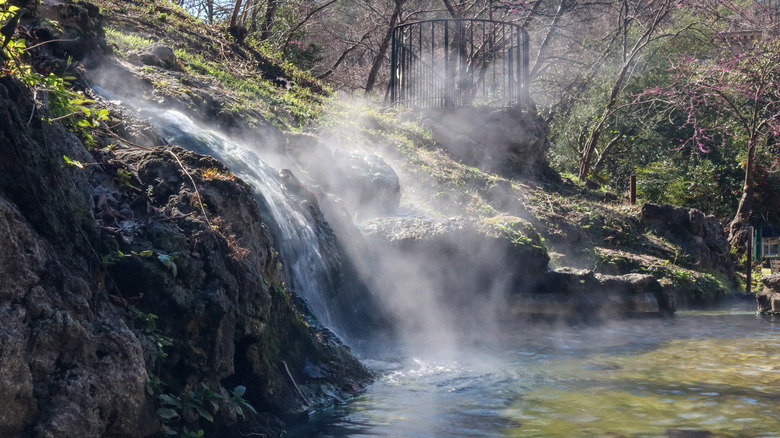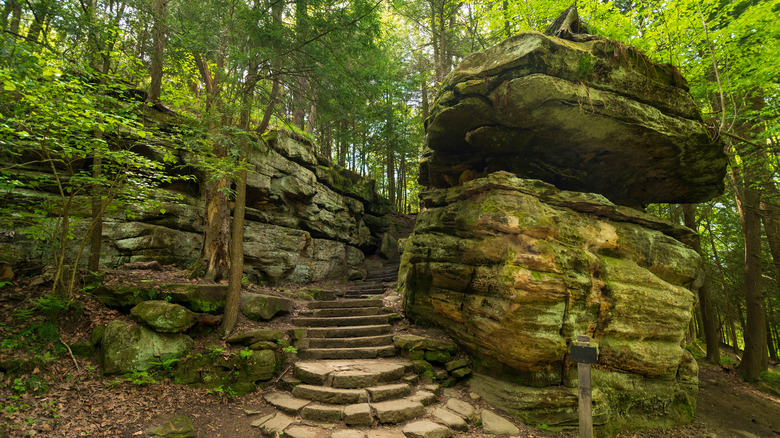Solar eclipses aren’t an unusual phenomenon, but 2024’s total eclipse offers long-distance visibility rarely seen in North America. The path of the eclipse will stretch from Mexico up to Canada, passing Dallas, Little Rock, Cleveland, Buffalo, and several other cities along the way.
During the April 8 event, onlookers can watch as the moon passes in front of the sun, blocking its light and turning the day sky dark for a few special minutes. While those who live in the eclipse’s path can enjoy the effect from their backyards and driveways, a more memorable way to commemorate the moment is by heading to a stunning natural landscape to watch the sky. Two national parks sit conveniently in the path of totality in two very different parts of the country: Hot Springs National Park in Arkansas and Cuyahoga Valley National Park in Ohio.
Visitors to Hot Springs National Park can expect to witness totality between 1:49 p.m. and 1:53 p.m. (local time), for a total of three minutes and 39 seconds of darkness. In Cuyahoga Valley National Park, the total eclipse will begin at 3:13 p.m. and will last up to four minutes.
Visit Hot Springs National Park for a one-of-a-kind eclipse experience

Hot Springs National Park, located just next to downtown Hot Springs, Arkansas, and less than an hour from Little Rock, is set to be one of the most beautiful spots to watch 2024’s solar eclipse. The 5,550-acre area boasts stunning mountains, gorgeous views, and scenic wilderness hiking trails. But what sets this spot apart from other national parks is its connection to a whopping 47 geothermal springs. The park’s hot springs have been used in bathing and healing practices for centuries, and today, people can still take a dip in the steamy natural waters.
The Arkansas park attracts tourists on any day of the year, but expect it to be especially busy during the solar eclipse festivities. The National Park Service suggests carpooling during the event and coming prepared for limited parking. To maximize your time in Hot Springs National Park, consider camping overnight ahead of the big celestial event. Gulpha Gorge Campground offers 44 campsites, each complete with electricity, water, and plumbing hook-ups. These campsites can be reserved six months in advance at Recreation.gov. Note that this is the only area where camping is permitted in the park, so backcountry camping enthusiasts may have to look for a spot elsewhere to pitch their tents.
Cuyahoga Valley National Park boasts 33,000 acres of viewing space

For those located in the northern part of the U.S., Cuyahoga Valley National Park may be a more accessible location to view the total eclipse than Arkansas’s Hot Springs National Park. Cuyahoga Valley National Park, situated between Cleveland and Akron, offers nearly 33,000 acres of protected land and is one of the most-visited national parks in the entire country. Park-goers visit for the impressive nature hikes, picturesque waterfalls, and historical sites dotting the area.
Cuyahoga Valley National Park is likely to be packed during the days surrounding the total eclipse viewing, and like Hot Springs National Park, the National Park Service suggests visitors plan accordingly. Traffic may congest the roads near the park, and designated parking areas will likely fill up fast. As a result, it’s best to arrive in the area early — before April 8 if possible — and leave after the crowds have dispersed. Note that camping is prohibited on park grounds, but sites are available within a few miles. Heritage Farms is the closest camping destination, located just 2 miles from Cuyahoga Valley National Park’s visitor center.
In honor of the eclipse, the Conservancy for Cuyahoga Valley National Park will host a series of educational presentations called “Exploring Dark Skies” leading up to the April 8 event. These discussions are perfect for those who live near the park and want to learn more about how the changing skies affect wildlife and nature.

